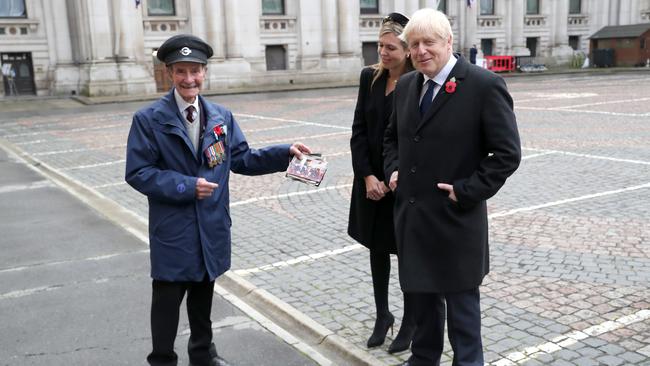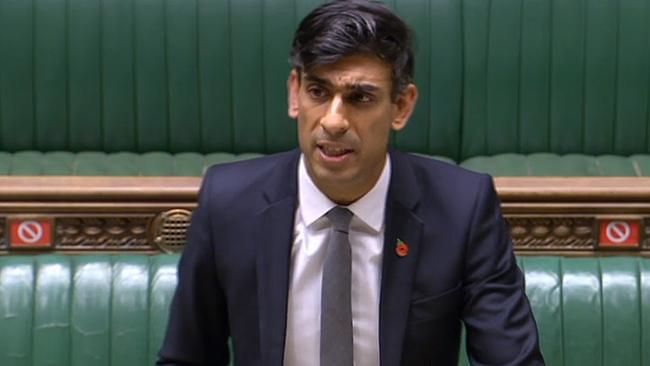Boris Johnson pledges $29bn military spending spree
Boris Johnson has pledged to end Britain’s ‘era of retreat’ with the largest investment in the military since the Cold War.

Prime Minister Boris Johnson has pledged to end Britain’s “era of retreat” with the largest investment in the military since the Cold War and plans for a new space command and artificial intelligence agency.
Mr Johnson will reveal a four-year funding settlement for the Ministry of Defence on Thursday night, worth an additional £16.5bn ($29bn). This is aimed at transforming the armed forces and bolstering global influence. It will address a shortfall of up to £13bn in the military’s existing 10-year equipment plan, while funding investment in a series of novel technologies and initiatives.
A long-delayed national cyberforce will be established alongside the new space command, which will be capable of launching its first rocket by 2022.
The cyberforce, a joint unit between the MoD and GCHQ, will help to protect Britons at home from cyberattack but will also deploy offensive capabilities against adversaries.
Efforts to improve Britain’s satellite defences will be pioneered by the space command. This week a senior military commander raised concerns about Chinese and Russian moves to develop anti-space weapons and warned that an attack on navigation satellite signals would cost Britain £1bn a day.
The AI agency is expected to develop autonomous weapons systems. At least £1.5bn of the additional cash will be allocated to military research and development, taking the total to £5.8bn. It will focus on advances in drone and aviation technology that could offer civilian as well as military applications.

Tempest, the UK-led program to develop a sixth-generation fighter jet, will also receive a tranche of the money. The various projects will create up to 10,000 jobs, Downing Street said.
Chancellor of the Exchequer Rishi Sunak who had pushed for a single-year agreement because of economic uncertainty, signed off the deal after intense wrangling with Mr Johnson in a meeting on Tuesday.
Mr Johnson said on Wednesday night: “I have taken this decision in the teeth of the pandemic because the defence of the realm must come first.”
The settlement reflected the need to upgrade military capabilities “across the board” amid an international situation “more perilous” than at any time in the past three decades, he said. “This is our chance to end the era of retreat, transform our armed forces, bolster our global influence.”
Defence analysts said that the settlement was more generous than anticipated but some warned that hard choices would still be needed. Although the money is agreed, details of the government’s strategy for foreign, defence, development and security policy will be finalised in the new year. The integrated review, which draws the strands together, is expected to be published at the end of January.
In a signal of what is to come, No 10 warned that the threat from adversaries had evolved since the Cold War and Britain’s enemies were operating in increasingly sophisticated ways. Downing Street said: “Rather than being confined to some distant battlefield, those that seek to do harm to our people can reach them through the mobile phones in their pockets or the computers in their homes.”
The money is in addition to a manifesto commitment to a real-terms increase in the defence budget of 0.5 per cent above inflation for every year of this parliament. In total the MoD budget is forecast to rise in cash terms by £24.1bn over the next four years, compared with last year’s budget.
Upgrading the military will form a pillar of Mr Johnson’s plan to “build back better” from coronavirus by creating jobs and will underpin a drive to defend free societies around the world.
It is also designed to cement Britain’s status as the largest defence spender in Europe and the second largest in NATO. This raises Britain’s chances of remaining the favoured military partner of the US, ahead of France.
Royal United Services Institute deputy director-general Malcolm Chalmers said of the settlement: “It is a remarkable tribute to the persuasive powers of the Ministry of Defence. It’s particularly striking that the government is prepared to make such a significant investment in defence at a time of great fiscal uncertainty.”
Defence Analysis editor Francis Tusa said that it risked “rewarding bad management”. “The black hole is not a Treasury problem, it’s an MoD problem — and they need to deal with it,” he said. Programs may need to be cut and personnel numbers fall to fund the modernisation, he added.
THE TIMES







To join the conversation, please log in. Don't have an account? Register
Join the conversation, you are commenting as Logout